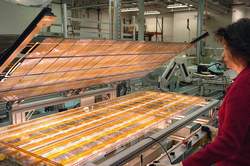
Thursday, July 10, 2008
A bright idea
Utility selling solar panels for homes
By Bob Kievra TELEGRAM & GAZETTE STAFF
rkievra@telegram.com
 An Evergreen Solar employee assembles a panel from an array of solar cells.
An Evergreen Solar employee assembles a panel from an array of solar cells.(T&G Staff file photo/JIM COLLINS)
The Massachusetts Municipal Wholesale Electric Co. yesterday said it has contracted with Marlboro-based Evergreen Solar Inc. to provide photovoltaic panels to municipal utilities and their customers, including those in Shrewsbury, Holden, West Boylston, Princeton, Templeton and Ashburnham.
Under the program, municipal utilities can purchase solar energy panels, electric current inverters and project installation services through a single contract with MMWEC, the Ludlow-based nonprofit that provides power and other services to the state’s 40 municipal utilities. The local utilities, in turn, will establish programs in which its customers can purchase equipment for use at their home.
"Our initial thought was to use the municipal installations to demonstrate the feasibility of these projects to other customers, but the interest in developing solar energy is high and customers already are stepping forward and requesting panels," MMWEC Chief Executive Officer Ronald C. DeCurzio said in a statement.
"The program is intended to make it possible to get a solar project installed and up and running," MMWEC spokesman David F. Tuohey said. "The interest is high, given the soaring cost of energy."
MMWEC has contracted with Evergreen Solar to purchase up to 500 kilowatts of solar panels for the first phase of the program, which runs through December. Eight municipal utilities have committed to purchase more than 100 kilowatts of solar panels.
Solectria Renewables of Lawrence will provide MMWEC with inverters needed to convert direct current solar energy to alternating current for use on local distribution systems. MMWEC has agreements with contractors to install solar projects in municipal utility communities, Mr. Tuohey said.
The cost of a system which totals one kilowatt is approximately $9,000, which includes panels, inverters, and installation, Mr. Tuohey said. The average New England home needs a system that provides 5 kilowatts.
"This is the kind of initiative needed to supplement municipal utility power supplies with solar and other renewable energy resources as a hedge against the rising cost of power generated by fossil fuels," Mr. DeCurzio said.
The state's municipal utilities serve approximately 400,000 customers in 58 cities and towns.
